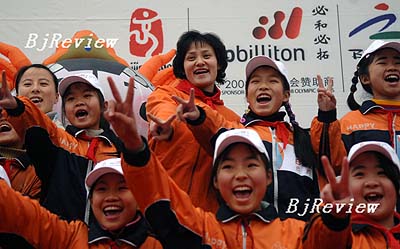|

For many Chinese people, a name is a reflection of the times they live in
According to a survey conducted by the National Citizen Identity Information Center (NCIIC) under the Ministry of Public Security, as of October 23, 2007 there are 3,491 citizens whose names are Aoyun, or "Olympic Games," 3,216 of these are male.
Experts say there will be definitely more Aoyuns, since China is expected to add another 18 million babies to its 1.3 billion people nationwide by the time the XXIX Olympiad begins.
Many young couples are preparing to have babies named Aoyun in 2008, because "eight" in Chinese has a similar pronunciation ba in Pinyin to fa, which means getting rich. The time, eight o'clock on August 8, 2008, when the Beijing Olympic Games open, is considered extremely auspicious, and even more so for a baby born at this moment.
A woman from the Niu family in Henan Province recently gave birth to quintuplets (two boys, three girls), and named them after the five Olympic mascots.
"This shows the way we farmers greet the Olympic Games," she said.
In November 2005, the five mascots of the Beijing 2008 Olympic Games were unveiled. They comprise Beibei the fish, Jingjing the panda, Huanhuan the Olympic flame, Yingying the Tibetan antelope, and Nini the swallow. The first syllable of each name combines to form "Beijing Huan Ying Ni," or "Welcome to Beijing."
Statistics showed that there are 4,449 people sharing the name of Beiei, Jingjin, Huanhuan, Yingying and Nini, with Jingjing, numbered 1,240, being the most in vogue, and Beibei, 624, sharing the least number.
Chinese parents often christen their children with names that represent both -- their good wishes for the children's future and good life prospects for themselves. Since ancient times, Chinese parents have named their children to record current events happening domestically and internationally. As a result, children's names changed with time and the changing society.
The Republic of China was founded in 1911 following the collapse of the feudal Qing Dynasty (1644-1911). Then, between 1911 and 1949, some 49,040 people had the first name Jianguo, meaning "establishment of the country." Since the founding of the People's Republic of China (PRC) in 1949, and after October 1 was nominated as the country's National Day, the number of people with this name has exceeded 960,000, according to statistics from NCIIC.
Many people chose Jiefang ("liberation"), Aijun ("love the People's Liberation Army") or Lixin ("the founding of the New China") as their children's first names at the beginning of the New China in the early 1950s. In 1958, after the Chinese Government launched a campaign known as the Great Leap Forward, many people were named Yuejin ("leap forward").
During the Cultural Revolution (1966-76), several people, hoping their behavior conformed to current demands, gave their children such names as Weidong ("guarding Mao Zedong"), Xuenong ("to learn farming") and Xuejun ("to learn military affairs").
Approximately 400,000 people, including singing stars like Sun Guoqing and Cai Guoqing, share the name Guoqing ("celebrating National Day"). In addition, some people are named after holidays such as Zhongqiu ("the Mid-Autumn Festival"), Yuandan ("New Year") and Qingming ("Pure Brightness Festival/Tomb Sweeping Day").
Between October 1955 and 1957, a great bridge was built in Wuhan, capital of Hubei Province in central China. It connected three towns of the city, and was of substantial importance for promoting the growth of local industry and agriculture. Thus, many people who were born after 1955 shared the names Tieqiao ("iron bridge"), Jianqiao ("building bridge"), and Daqiao ("great bridge").
Chinese names vary with different regions. Beijing girls are often named Jing ("quiet"), and girls in Harbin, capital of Heilongjiang Province in north China, are christened Shu ("kind and gentle"). In south China, Ying ("outstanding person") is a common women's name.
(Sources: nciic.com and Hubei TV) |
